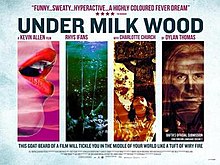|
Under Milk Wood (2015 film)
Under Milk Wood (Welsh version: Dan y Wenallt) is a 2015 Welsh drama film based on the radio drama of the same name by Dylan Thomas. It is adapted and directed by Kevin Allen. The narrator is Rhys Ifans. The film was selected as the British entry for the Best Foreign Language Film at the 88th Academy Awards but not nominated. Cast
ProductionThis was the first feature adaptation of the play since the 1972 film, which starred Elizabeth Taylor and Richard Burton.[1] It was largely filmed in the Pembrokeshire village of Solva during the summer of 2014.[2] Two versions of the film were shot, one in English and the other in Welsh (known as Dan y Wenallt). Dan y Wenallt was put forward for Best Foreign Language Film at the 2016 Oscars.[1][3][4][5] The film premiered simultaneously in Cardiff and Theatr Gwaun in the Pembrokeshire town of Fishguard, before being shown around Wales in December 2014 as part of the centenary celebrations of Thomas's birth.[6] It received its official UK premiere in June 2015 at the Edinburgh International Film Festival.[7] ReceptionOn review aggregator Rotten Tomatoes, the film holds an approval rating of 33% based on 18 reviews, with an average rating of 5.1/10.[8] The Independent in its review of the film says it "shows tremendous visual imagination in places and has plenty of ghoulishness, scabrous humour and eroticism along the way" and "doesn't hold back on depicting the grotesquerie of the Wales that Dylan Thomas evoked".[9] Rhys Ifans' "delivery is calmer and more measured than Burton's mercurial, intensely dramatic rendition" and just about holds together the "dozens of surrealistic tableau-like scenes". It gives the film three out of five stars.[9] The Daily Mirror also gave the film three out of five stars, though describing it as a "noble failure" where the director "deploys no end of visual tricks to match Thomas’s lyricism – a glaring palette, soft focusing and even a camera seemingly mounted on the back of a mouse – but the tricks distract as much as they divert".[10] Variety magazine pointed out the humour of the original play had not aged well, the performances of the cast were "obscured by the film’s florid visual style and fruity versification", while the Welsh cast and Welsh language version would have "limited appeal outside Wales" and "minor status as a local curiosity".[11] Screen Daily described the film as a "sticky mess of sexual urges and intrigue, ...which clouds Thomas’ work rather than clarifies it" with the visual component "frequently distracting and sometimes outright unpleasant".[7] See also
References
External links |
||||||||||||||||||
